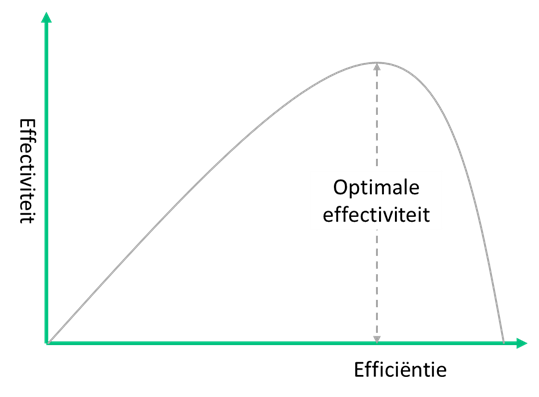We are used to steering towards efficiency. After all, efficiency often leads to lower costs, better products or higher performance. This has indeed been the case for a long time, but is more efficiency still better? Or is it now leading to lower performance, lower quality and undesirable effects?
I often think back to a figure I saw some years ago, in which efficiency and effectiveness were pitted against each other. When you steer towards more efficiency, effectiveness increases with it for a long time. However, there is a point at which higher efficiency leads to lower effectiveness.

In the figure:
Effectiveness
Efficiency
Optimal effectiveness
Knocked-out efficiency
In the Netherlands – and a large part of the Western world – we have passed that point, in my opinion. We have overshot. We’re only able to think in terms of efficiency, and we can hardly ask ourselves what actually contributes effectively to our society. Here are three examples, from three different angles:
- My own parquet. The oak wood of my parquet flooring comes from France, yet before it arrived in the Netherlands, it sailed to China and back so the tree trunks could be sawed into planks. We often talk about making steps of the supply chain, such as transport, more efficient. But wouldn’t it be much more effective to organize the supply chain differently?
- Our national nitrogen emissions. Nitrogen emissions from Dutch livestock are too high. The government plans developed to tackle this mainly look for technical solutions to emit less nitrogen per stable. This contributes to increasing the (environmental) efficiency of meat and cheese production, but wouldn’t promoting plant-based substitutes be a much more effective way of reducing the number of animals – and thereby cutting nitrogen emissions?
- Working digitally. Since we collectively started working digitally, most people’s schedules have become fuller rather than emptier – even while our travel time has all but disappeared. We are more efficient than ever at coordinating what we’re doing. But to what extent are we using these digital consultations effectively in decision making? Or are we less effective, because the next meeting is planned at the click of a button, and people can more easily distance themselves in a discussion?
I haven’t even mentioned the approach to Coronavirus infections in the Netherlands, which fits this way of thinking well. Despite the fact that our vaccination process has now been established quite efficiently, it’s difficult to control the infection rates effectively if we reopen nightclubs at the same time. Since festivals have now been cancelled because of this, there’s question as to whether opening clubs two weeks ago was effective.
Climate challenges are growing
At the same time, the challenges of climate change are still growing by the day – as are the other sustainability challenges, including biodiversity loss. The expected global CO2 emissions for 2021 are higher than those of 2019, while we need to have halved them by 2030 at the latest to be in with a chance of limiting the temperature rise to 1.5 degrees.
Steering towards effectiveness hardly seems to be on the agenda for tackling climate change either. We make agreements about reductions, but time and again we either fail to achieve them or do so with great pain and difficulty. For example, at the end of 2020 the Netherlands had to purchase Danish green electricity to compensate for our CO2 emissions and to meet the Urgenda judgement. It was undoubtedly very cost-efficient, but it didn’t contribute in any way to effectively reducing emissions. It was also a short-term decision, and it is now clear that it will be challenging to achieve the reduction target for 2021 too.
Base decisions on effectiveness
With the summer vacation just around the corner, I hope that whoever you are and wherever you work, you take the time to zoom out; to connect with yourself, with your heart; to ask yourself what you want to contribute to.
To decide whether to stay in this race towards ever-increasing efficiency, or to steer yourself towards the most effective possible contribution to the world in which we live.